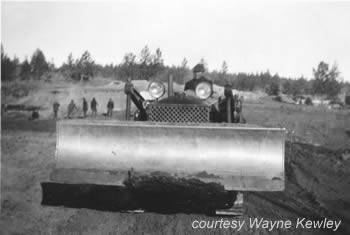Category: History Date: 2016-05-14
Cletrac Crawler

Cletrac Inc. was a manufacturer of tractors for military and civilian use, was organized by ROLLIN H. WHITE as the Cleveland Motor Plow Co. in 1916, with capital of $6 million. White, a founder of the White Motor Company, had 10 years earlier formed this new firm to produce the crawler-type tractor he had developed for general farm use. First located at Euclid Ave. and Lamb, the plant later moved to 19300 Euclid Ave.
Renamed Cleveland Tractor Co. in 1917, the company sold 40,000 tractors in the U.S. and 70 foreign countries during its first decade. In the early 1930s, the needs of the Civilian Conservation Corps (CCC) and public works projects kept the plant open, and by 1937 the firm, which employed 1,500 workers, enjoyed record tractor sales here and abroad.
Two years later, the company introduced 3 new lower-priced tractors with 4-cylinder engines for use by the small farmer. The military application of Cleveland Tractor's products became dominant during World War II when the firm manufactured a new, high-speed tractor for hauling artillery.
Although the company received a steady flow of orders, the low profit in defense work and the research costs for new products convinced company President White to sell the company to the 96-year-old Oliver Corp. of Chicago in 1944. Oliver invested $3.5 million in the aging plant to develop new products. However, Cleveland Tractor remained unprofitable until the Korean War revived its business.
When White Motor Company took a 2-year option to buy the tractor plant and acquired exclusive rights to the Oliver name in 1959, Oliver renamed its Cleveland facilities Cletrac Inc. In 1961 White Motor bought the local Cletrac inventories, engineering designs, and machine tools and closed the plant, consolidating all production at a second plant in Charles City, Iowa.x
Photo of the Cletrac is from the many photos donated by Wayne Kewley.
xInformation found at tractors.wikia.com
The needs of the Civilian Conservation Corps (CCC) and public works projects kept the plant open.






